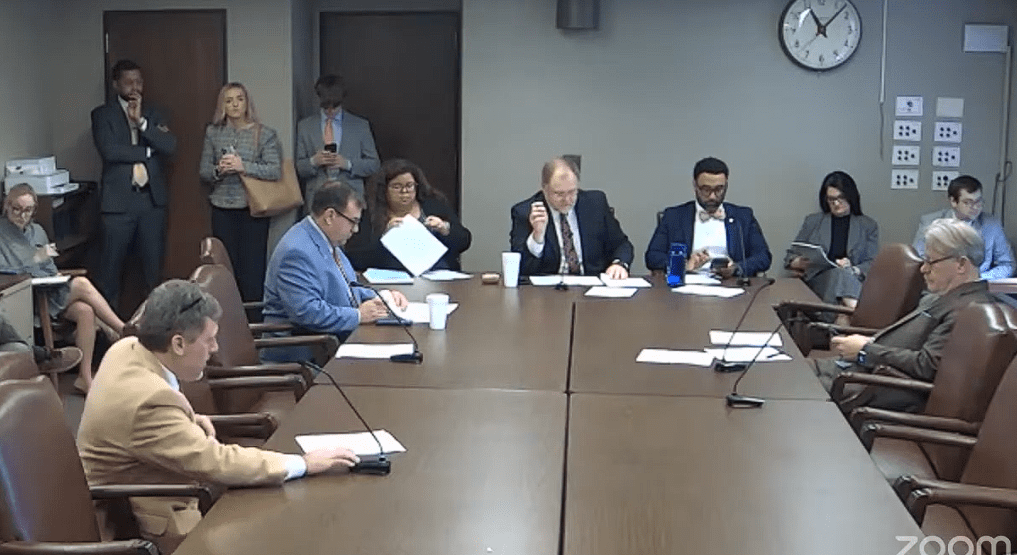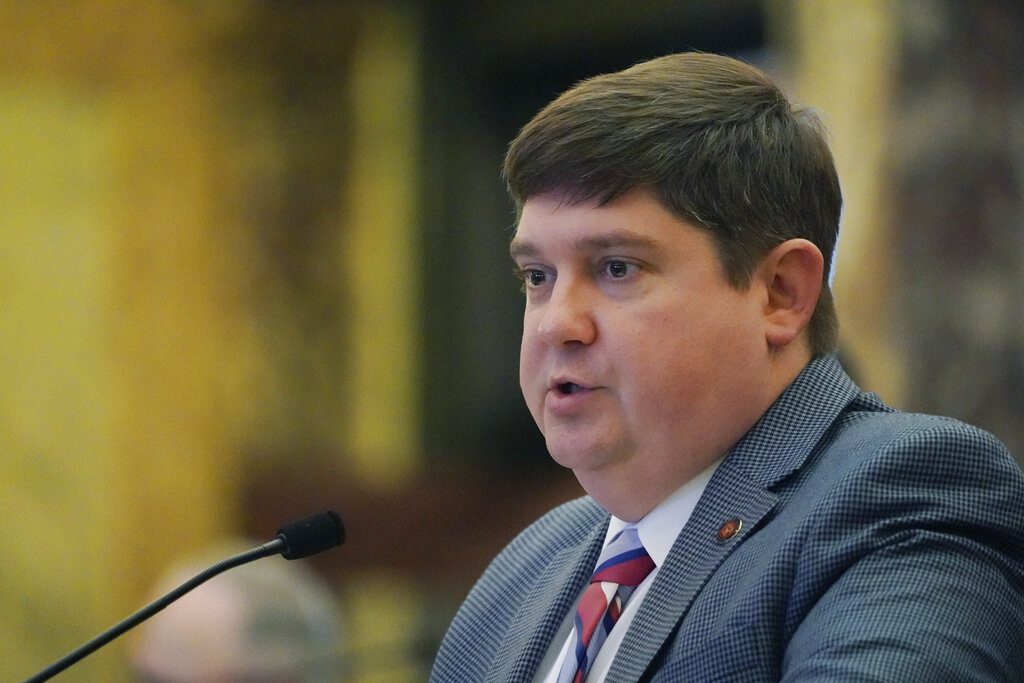
The motion to table Amendment 2 passed 70-46 and Amendment 3 by a vote of 73-42.
The Mississippi Legislature faces a Wednesday deadline for floor action on revenue and appropriation bills. Against the backdrop of this deadline, the House of Representatives took up a series of revenue bills Tuesday evening.
One of the bills, House Bill 1671, sought to increase tax credits available on certain charitable giving, including giving aid pregnant mothers. Prior to the introduction of the bill, there had been repeated requests for bills to be read aloud by State Rep. Omeria Scott (D). The process of reading bills aloud slows the consideration of legislation and can create problems in getting bills heard before a deadline.
After State Rep. Trey Lamar (R), Chairman of the House Ways and Means Committee, introduced the HB 1671, three amendments were introduced. Two of the amendments were tabled and one was passed.
The first amendment was introduced by Rep. Lamar and passed on a voice vote.
The second amendment and third amendment were introduced by State Rep. Robert Johnson (D), the House Minority Leader.
The second amendment would have required HB 1671 to not take effect unless a general bill is passed into law to expand Medicaid postpartum coverage for eligible women. Under current law, the state provides sixty (60) days of postpartum coverage. The amendment would have expanded the coverage to twelve (12) months. A bill that would have done the same previously failed to pass out of committee.
Rep. Johnson said mothers who give birth in Mississippi are more likely to die here than in 45 other states.
“We are living in a system where, sure, we say that we want to protect life, but we are doing nothing to protect women and children postpartum after they’re born,” Johnson said, adding that the amendment, consistent with the bill being offered, says that they care about women and children.
Critics have argued that while Mississippi’s maternal mortality rate is unreasonably high, there is no proof that expanding postpartum coverage solves the issue. The Division of Medicaid previously indicated that of the forty pregnancy-related maternal deaths identified by the Mississippi Department of Health from 2017-2019, thirty of the mothers were on some form of Medicaid at the time of death, including twenty-five that had full coverage and five that had reduced family planning coverage.
A motion had been made to table the amendment, to which Johnson said, “even though we’re in the Legislature, and this is a democratic organization, that sometimes open, and clear, and transparent debate on real issues that affect people in this state, sometimes even though you’ve been elected to do just that, you don’t want to do it.”
“But I’m going to take my five minutes to say one thing: explain to the public when a motion is made to table an amendment, that means they don’t want to hear what you have to say,” Johnson said. “That means they don’t want anybody to know what it is that we’re up here doing. That means that an issue that is an important as women and children, and the birth, and the life, and the ability to survive, nobody wants to talk about.”
“So if you want to vote to table an amendment, understand that the public will know not only are against women and children, but you’re against the democratic process,” Johnson said. “Vote this amendment up or down, but either way, the world will know who you are and what you’ve done.”
Motions to table are part of the normal procedure available to the Legislature to move debate forward and are most frequently employed as a way to save time by not having prolonged debate on something that the movant believes cannot pass. The motion to table Amendment 2 passed by a vote of 70-46.
The third amendment, also authored by Rep. Johnson, would have amended on line 1299 by inserting before the period the following:
However, this act shall not take effect unless a general bill is passed into law increasing Temporary Assistance for Needy Families (TANF) benefits as follows: for the first family member in a dependent child’s budget to an amount not to exceed Four Hundred Dollars ($400.000) per month; for the second family member in a dependent child’s budget to an amount not to exceed Seventy-two Dollars ($72.00) per month; and each additional family member in a dependent child’s budget to an amount not to exceed Forty-eight Dollars ($48.00) per month.
“Since you don’t want the world to know that you care about women and children, here’s an opportunity for you to say at least that $270, that’s all we give women and children in a family of three to live on after we’ve let rich Mississippians steal $95 million from the federal government from our programs,” Johnson said. “This amendment simply says that we will raise the allotment for women and children to at least $400 a month and $72 a month for every other person in the household, which means that’ll be around $580 a month.”
“If you don’t want to take care of them in a hospital, at least vote to feed them,” Johnson said.
The motion to table Amendment 3 passed by a vote of 73-42.
Following the table of Amendment 3, there was a motion for previous question.
The motion for the previous question is used during the consideration of a matter to end debate, “foreclose the offering of amendments, and to bring the House to an immediate vote on the main question.” Motions for previous question are, like a motion to table, a procedural mechanism to save time in debate. It is most often used when the movant believes that debate has become duplicative or has wandered from the topic being voted on by the membership.
Those opposed to the motion had ten minutes to speak.
Rep. Zakiya Summers (D) asked the lawmakers to oppose moving to the previous question and explained why.
“These amendments are to support women, families, and children in the state of Mississippi. We have received testimony, report after report, from mothers all across this state that are dealing with some tremendous barriers that cause them not to be able to enter into the workforce, that cause them to not have access to the things they need to raise their children,” Rep. Summers said.
Summers told the House that she was once a single mother and had two sons before she got married. She said she was blessed to have a village that could help her with her children.
“But there are so many women here in the state of Mississippi that don’t have that village and they depend on programs like this to help them take care of their children,” Summers said. “We have an opportunity today to support the Chairman’s bill, but make it better. Make it better in a way to where we’re helping children, and families, and women in the state of Mississippi.”
She asked the lawmakers to give them an opportunity to at least present the amendments and vote them up for down.
“That’s the process,” Summers said.
Rep. John Hines (D) said that debate is healthy.
“A healthy debate allows people to understand different viewpoints and opinions,” Hines said. “Allow people to have their discussion whether you agree or disagree. This is a process where we are to have discussions about pertinent things in this state and we need to be about the business of the work of the people.”
Hines said he’s asking not to move to previous question, but also to allow people to have simple debate and discussion on pertinent issues.
“Let’s have some very vibrant and open dialogue about issues,” Hines said.
The motion for previous question passed by a vote of 68-46, after which the bill passed and will head to the Senate.
Following the floor action, Speaker of the House Philip Gunn (R) said he believes lawmakers had a number of amendments that were coming and the bills were being read.
In regards to State Rep. Jody Steverson (R) moving for previous question, Gunn said he was sure it was in response to the bills being read and “tomorrow’s a deadline. You can’t read them and engage in extended debate because of the time it consumes.”
You can watch Tuesday’s full floor meeting below.











